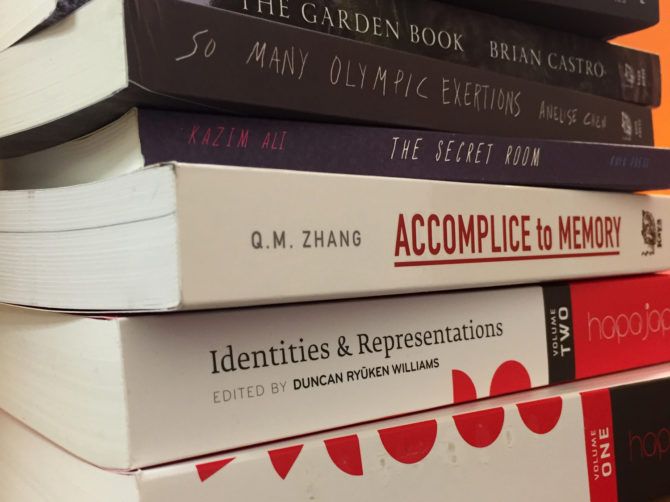A Message from Kaya Board President Juliana Koo:
Over my 20 years of association with Kaya Press, as current Board president and past Managing Editor, I’ve always assessed whether its core mission remains relevant. In 1994, an Asian American perspective in publishing was sorely needed—commercial houses were putting out a single-note, exoticized idea of an Asian diasporic narrative, which Kaya’s authors challenged time and time again. Two decades later, do we still need Kaya?
This spring I had the privilege to attend a reading by new Kaya author QM Zhang, and after experiencing the complexities of her book, Accomplice to Memory, I knew that Kaya remains necessary. No other publisher has the dexterity, sensitivity, or patience to have published this stunning volume—a graphically rich combination of experimental fiction, memoir, and historical research.
Kaya’s ability to present complicated and nuanced writing from an Asian American, or Asian diasporic, point of view, is even more important now, as this country falls into increasingly simplistic debates about immigration and racial inequity. And this work is impossible without support from readers like you.
2017 has been a landmark year for Kaya. We published eight remarkably varied and exciting new books—the highest number of books for Kaya annually ever:
• The Flayed City: an “ambitious and deftly structured” [LA Review of Books]
poetry collection by Hari Alluri.
• Accomplice to Memory by QM Zhang—a hybrid memoir that’s “a radical
investigation into the nature of truth and memory” [Foreward Reviews].
• Kazim Ali’s structurally inventive The Secret Room—a novel written as a string
quartet, which had a staged reading this Fall at Davidson College.
• Hapa Japan 1 and 2: A two-volume set of definitive books on the Hapa
Japanese experience edited by Duncan Ryuken Williams.
• So Many Olympic Exertions: Anelise Chen’s “formally unique and inventive”
[Publishers Weekly] debut novel.
• The Garden Book: the US edition of leading Australian novelist Brian Castro.
• Stolen Oranges: a novel that imagines a set of letters exchanged between Miguel Cervantes and Emperor Wanli of China, by Max Yeh, of whom the great Asian American literary scholar Dorothy Wang writes: “I know of no other writer like him in Asian American literature.”
Along with all the titles, the Smithsonian Asian Pacific American Center recognizes
Kaya’s important role in American letters today. Kaya was chosen as an organizing partner for the first national Asian American Literature Festival this summer in Washington D.C.. Many Kaya authors were featured, including Kimiko Hahn, Kazim Ali, Gene Oishi, Hari Alluri, and Anelise Chen; and Kaya stood shoulder to shoulder with other literary institutions, such as the Library of Congress, POETRY Magazine, and the Academy of American Poets.
I’m so proud of how far Kaya has come, and excited to see how its dedicated and talented staff will continue to live up to its mission. I invite you to join me in the support of Kaya with a financial contribution. In honor of Kaya’s stellar year of publications and events, we’ve made a goal of raising $10,000.00 by Dec. 31st . Let’s work together to make 2018 an even more spectacular year for Kaya Press and Asian American literature.
– Juliana Koo, December 2017
Donate here!
Or mail a check made out to Kaya Press:
Kaya Press
C/O USC ASE
KAP 462
3620 Vermont Ave
Los Angeles CA 90089


Leave a Comment
We'd love to know what you think.